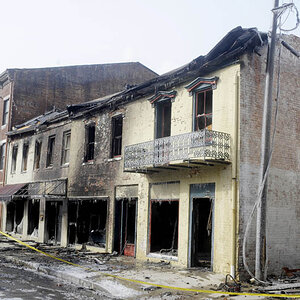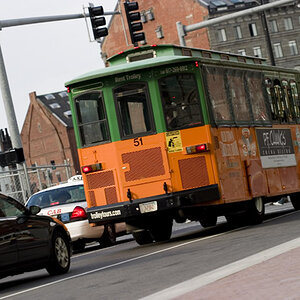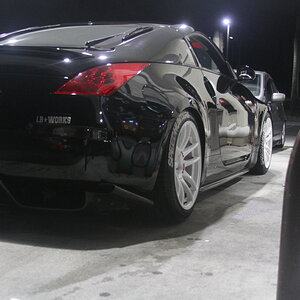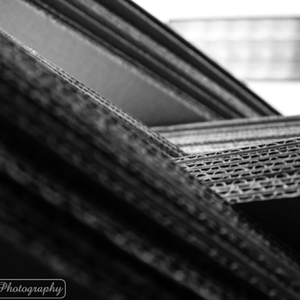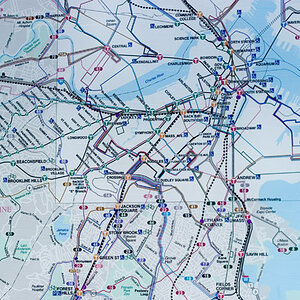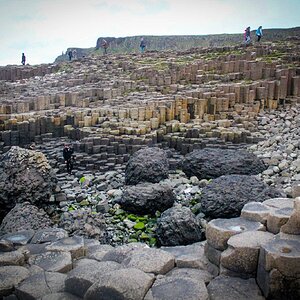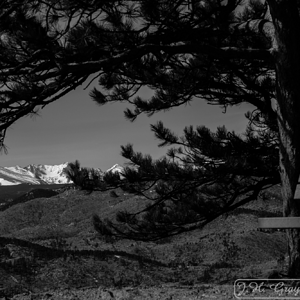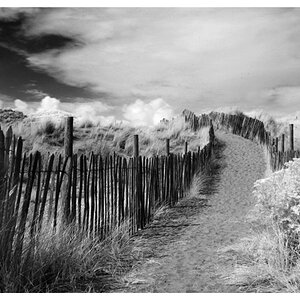SilverGlow
TPF Noob!
- Joined
- Oct 21, 2008
- Messages
- 95
- Reaction score
- 0
- Location
- Orange County, Calif
- Can others edit my Photos
- Photos OK to edit
And there in a nutshell is the main difference between digital and film.
Film does have limitations. You have to select the right film for the job (or do the pro trick of having several camera bodies/backs with different films in). Lighting and exposure are, to an extent, critical to get the optimum result out of film. And you can't see what you have taken to assess the results fully until it has been processed, even if you shot polaroids first.
All of this means that, when film was King, to be considered good (or better) as a photographer a person had to have skill, knowledge, expertise, patience, vision, aesthetic awareness, and the confidence in one's abilities to put it all together and pull an image out of the metaphorical hat.
Digital is immediate, flexible, fast, cheap and allows a very high degree of post-processing. The camera itself does a lot of the work with the mass of technology built in to ensure that exposure is correct, focussing sharp and camera shake reduced*.
The size and relatively low cost of memory cards means that you can take literally thousands of pictures - in minutes if you wish. And you can view them all as you go.
And 'creativity' can be achieved with a wave of the airbrush tool in Photoshop**.
In short, old-school film photographers had to be good and think before they shot.
Digital photographers who have not had the discipline of film trust to the equipment and to luck.
"More pictures means more chances for keepers" is the same as saying "the more pictures I take the higher the chances of me getting a good one". That approach, I am afraid to say, does not require skill, intelligence or ability, just luck.
Don't get me wrong. I love digital. I have almost as many digital cameras as I do film cameras. And I haven't shot on film for years.
I like the benefits of digital - in particular I love not having to spend most of my life in a darkroom. But I am also aware of the pitfalls.
Digital and all it's technology makes it appear so easy to get a 'good' picture that a lot of the people using it have gotten complacent and lazy.
When I used to shoot on film I could spend ages in the studio getting everything right before taking a single picture (two weeks once to set up a still life) so that when I did take the shot I only used three or four sheets of film. Even in situations which required the shooting of a lot of film I would still think about what I was doing and didn't snap away willy-nilly.
The result was a cropping ratio of approximately 4:1 - at least every fourth frame on a roll would be a good shot***.
I take the same approach with digital as I do with film.
The right thing at the right moment with the right settings - with a bit of time getting the PoV and composition right. Then I take just one or two shots.
I don't need to take any more unless I have messed up.
And I do the bare minimum of post-processing.
If I want to get creative I do it with the camera and not with my computer.
The bottom line is that whether it's digital or film the images produced are only as good as the person operating the camera.
Now can we put an end to this childish 'argument'?
Some of you would do better using the time you are wasting here to learn how to take a decent picture :twisted:
* The modern digital camera if set on full auto only requires an operator - formerly known as the photographer - in order to have someone to carry it around and press the shutter.
** Actually, modifying an image in Photshop is not being a photographer. Photoshop works in the zone known as 'post processing' and any work done using it is more accurately called 're-touching'. To a film photographer working pre-digital, having to send your pictures to be re-touched was anathema as it made you feel you had made a mistake somewhere.
And Photshop itself is not nearly as creative as people like to believe. You can only do things that are allowed by the software programmer so you will always be working within those limitations.
You are not creating what you can imagine - only doing what someone else lets you
*** OK you digital shutter bugs who take thousands of pictures in a weekend. Count how many pictures do you actually take and divide it by the number of 'keepers' you get. If the ratio is over 25:1 then I suggest you put the toy away and learn to take pictures with a film camera first.
You might learn something :lmao:
It seems you never shot a wedding ;-)
Making pictures is like fishing. The longer you keep your hook in the lake, the more likely you'll get a keeper. It's not just about skill, as you suggest. All the skill in the world will not do you any good if you don't take the chance to get that decisive moment. And too often when shooting film weddings, I could not get all the decisive moments. With digital the number of decisive moments are not anymore had I shot film. However, the moments I miss with digital are less.
When I shoot digital weddings, I may as well not have the LCD on the back of the camera, because things happen so fast at times. The processional, the recessional....they move and stop for no one so what good is an LCD if you don't have the time to gawk at it? In other words, getting the exposure right in digital IS AS IMPORTANT as if shot with film.
And why you suggest one would shoot a wedding with the digital body in full auto is beyoud me. Surely you're kidding, right?
No, you are wrong again...the digital camera DOES NOT doe a lot of the work. Weddings are about raw. Raw means the camera ONLY captures the light, and the photog does all the mastering work later...he calls the shots and not the camera.
Funny you say that when you want to get creative you do it with the camera and not with the computer....Ansel Adams would disagree with you because he got creative AFTER the camera did it's job: in the wet darkroom, which is analogeous to the dry digital darkroom.
And about PhotoShop, you are wrong again. One is never limited by how the software programmer developed the program. This is as foolish as saying that a film shooter is limited by the engineer that designed the enlarger, or the photographic paper...silly, to be sure. What an enlarger and paper and computer program provide are tools that allow for INFINITE POSSABILITIES. Infinite.
Now you ask digital shooters to take the number of images we take divided by the number of keepers? What does this prove? Even Ansel Adams wrote that in a good year he will make 2-5 keepers. So I guess he's a lousy photographer...
Modifying images in PhotoShop is not being real photographer? I guess Ansel was not a real photographer either because he "cheated" in the wet darkroom with all kinds of tricks...
It seems that you hate digital and I suspect are very frustrated with it, and this comes out as very negative and hateful to digital just because your skills are better with film. I would suggest you take some classes in digital so that you too can be posative about it.
I wish your ilk would stop this film versus digital hatred and especially when you use lame and untrue arguments to prove your point.
I for one love film. And digital too. They both have their strengths and usages. May film live long and for decades to come. Along side digital.
And don't think for one second that digital shooters have it better, or easier then film shooters. These comments of yours are a profound insult to the many of us that have spent years honing our digital craft.


![[No title]](/data/xfmg/thumbnail/33/33489-cc76e5d22658c0f79ccb4ae9d307610d.jpg?1619736003)
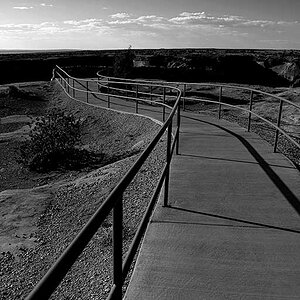
![[No title]](/data/xfmg/thumbnail/37/37633-94737d4436dff45b827dcc332ff7fba9.jpg?1619738156)
